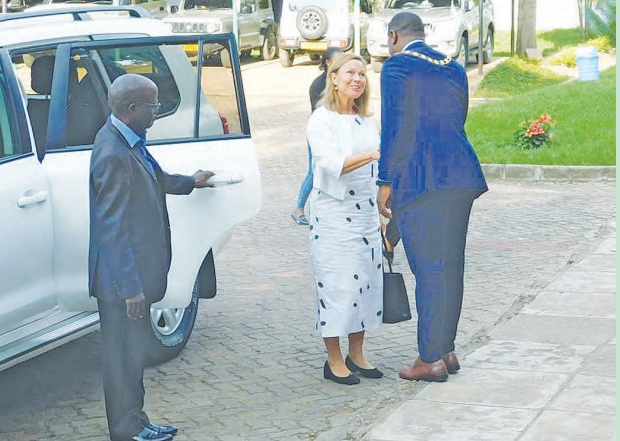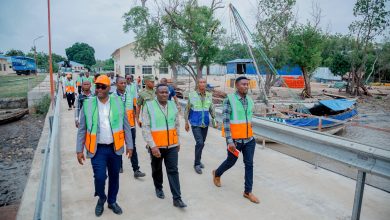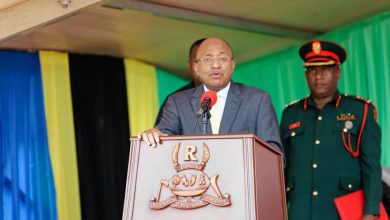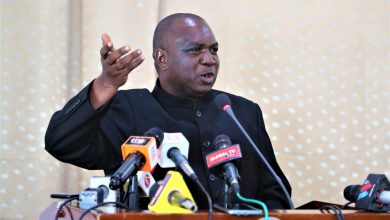Tanzania and Finland: A partnership forging economic, diplomatic growth

TANZANIA: WHEN two nations or countries establish strong bilateral relations, they normally unlock a range of economic, diplomatic and national relations benefits.
Those benefits not only promote mutual growth but also contribute to global stability, economic growth and improve bilateral cooperation among countries.
In the area of economic benefits, according to economic experts, strong diplomatic relations encourage trade agreements that will reduce tariffs and barriers, making it easy for businesses to operate across borders.
That situation will boost exports, imports and foreign direct investment and hence stimulate the country’s economic growth.
However, trade agreements and investment projects create jobs in both countries, leading to higher employment rate and increased economic productivity.
Economic partnerships also promote the exchange of technology, expertise and innovation, allowing both nations to enhance their industries and improve their competitive edge in the global market.
And for economic stability, Strong economic ties provide stability by diversifying markets and reducing dependency on a single country or region. This minimises risks associated with economic downturns.
For diplomatic benefits, diplomatic cooperation fosters alliances that can lead to mutual support in international forums like the United Nations, World Trade Organisation or regional blocs.
Also, good diplomatic ties reduce the chances of conflicts and make dispute resolution easier through dialogue and negotiations instead of military confrontations.
Positive diplomatic ties lead to favourable public perceptions, fostering trust and reducing stereotypes between the populations of both nations.
Bilateral agreements on visas, work permits, and residency make it easier for people to travel, work and live in each other’s countries, strengthening social and economic bonds.
Improved relations lead to increased tourism, as travellers feel safer and more welcome, boosting economic revenue and promoting cultural exchange.
Nations or countries with strong relations work together on global issues like climate change, cyber security and sustainable development, making collective progress more achievable.
When two nations strengthen their relationships, they benefit in multiple ways, from economic growth and political stability to enhanced national security and cultural exchange.
These partnerships create a foundation for a prosperous, peaceful and cooperative international environment.
Due to that fact, Tanzania and Finland have had a long relationship since the 1960’s and since then, Tanzania and Finland have cultivated a multifaceted partnership yielding significant economic, diplomatic and social benefits.
According to the available data, in the 2021–2024 periods, Finland allocated approximately EUR 56 million to Tanzania, emphasising democracy, gender equality and sustainable forest-based livelihoods.
Speaking in Mwanza city recently, during her official visit, the Ambassador of Finland to Tanzania, Ms Thereza Zitting said the existing relationship between the two countries has been characterized by collaborative efforts in development cooperation, trade, governance and cultural exchange.
She said Finland has been a consistent development partner for Tanzania, focusing on sectors such as forestry, education, and good governance.
In the area of trade, she said both nations have expressed a desire to enhance mutual trade and investments and insisted that Finland will continue strengthening cooperation with Tanzania, particularly in economic development and environmental conservation, with a focus on tree planting and forest conservation.
She expressed her satisfaction with the continued bilateral cooperation between the two countries, clarifying that while some countries have severed diplomatic ties due to various reasons, Tanzania and Finland have remained committed to their partnership.
She praised President Dr Samia Suluhu Hassan for her efforts in strengthening economic diplomacy and bilateral relations, citing the recent energy summit which was held in Dar es Salaam city as a notable example.
“The summit was one of the best organised in the country. I see the President’s initiative in clean cooking yielding positive results”, she said. She highlighted that President Samia’s initiatives in promoting clean cooking energy have greatly benefited Tanzanians, especially women, by reducing health and safety risks associated with traditional cooking methods.
“I saw this as a crucial initiative to support women, who face significant risks when cooking at home”, she added.
She further explained that the initiative will also contribute to environmental conservation by reducing the reliance on firewood for cooking, which leads to deforestation, emphasising that Finland and Tanzania’s cooperation in forestry remains strong and sustainable.
“One of our successes is the cooperation between civil society organisations, in addition to government-to-government collaborations”, she added.
Ambassador Zitting noted that both countries are placing increased emphasis on private sector collaboration and are exploring new forms of cooperation, such as city-to- city partnerships. She highlighted the longstanding cooperation between Tampere City in Finland and MCC in Mwanza city which began in 1988.
“I was happy to hear that the partnership between Tampere City and Mwanza City Council has existed since 1988. Over the years, they have engaged in various twinning activities”, she explained.
She noted that last year, both cities collaborated with UN-Habitat to explore ways to implement SDGs together.
“This is significant work, and while much has been achieved, there is still more to do. We will continue to explore the best ways to collaborate”, she added.
Ambassador Zitting emphasized that the partnership has been particularly successful in the areas of education and infrastructure, reaffirming Finland’s strong friendship with Tanzania.
“At the moment, we are working closely on forest conservation—keeping forests green, healthy, and viable”, she explained, additionally, we are promoting gender equality by encouraging women’s participation in economic and political life”, she explained.
She also highlighted the extensive areas of cooperation between the two countries, including government collaborations, civil society partnerships, and institutional linkages.
“My wish for the Tanzanian people is to continue this valuable cooperation. We have many opportunities to work together in the future”, she said.
Mwanza Regional Commissioner Mr Said Mtanda invited Finland to invest in modern fish farming in Mwanza City, citing the availability of water infrastructure for the farming, explaining that more than 53 per cent of the city’s area is surrounded by the waters of Lake Victoria.
He praised the Finland government for the support he had been offering in the country especially in the area of education, environment conservations and technology promising to enhance the existing cooperation between the two countries.
Mwanza City Council (MCC) Mayor, Mr Sima Constantino, said the council’s commitment to translating those collaborative efforts into tangible benefits for the community by integrating social, economic, political and cultural development initiatives.
Mr Sima expressed appreciation for the support and mentorship provided by Tampere City in SDG localisation, which promotes global goals at the local level.
Mr Sima noted that past projects under the Tampere Mwanza sister city cooperation have had a positive impact on the environment, education and good governance.
“As Mwanza City Council we are privileged to pioneer SDG localisation, setting an example for other cities in Tanzania following our first local SDG review”, he said.
He also acknowledged the role of UN-Habitat in funding Mwanza’s first voluntary local review and facilitating the city’s participation in international platforms such as the UN-Habitat Annual Meeting that was held in Kenya and the World Urban Forum in Cairo, Egypt.
“The new city strategy adopted in 2023 by Tampere City, along with our Mwanza City strategic plan, has allowed us to align our development goals with the SDGs”, he added.
The Acting MCC Director, Mr Jeremaya Luberege, highlighted the council’s achievements in SDG implementation, particularly in creating a better working environment for staff, improving healthcare facilities and advancing the education sector.
The Mwanza-Tampere Cooperation Project Coordinator Mr Amin Abadallah said MCC has gained more benefit after adopting a voluntary local review of progress on the SDGs that is undertaken by local and regional governments to foster SDG localisation and demonstrate local governments’ capacity and commitments.
Explaining the genesis of the cooperation between two cities of Mwanza and Tampere of Finland, Mr Amin said the cities of Mwanza (Tanzania) and Tampere (Finland) jointed their efforts under the North South Local Government Cooperation Programme since the beginning 2002, where the history of their Cooperation goes back to 1988, when Tampere and Mwanza became twin sister cities.
“The cooperation project has engaged in supporting development projects and capacity building of Mwanza city ensuring the improvement of service delivery by supporting good governance, environmental conservation, school cooperation, Fire Prevention Emergency Unit and University Cooperation “, he explained.
According to Mr Amin, on October 2022, the city of Mwanza (Tanzania) and city of Tampere (Finland) established a two-way collaboration to drive the implementation of the SDGs in their territories and to monitor progress through the development of Mwanza voluntary Local Review (VLR) that signed memorandum of understanding with UN Habitat to coordinate the implementation of localising the SDGs in Mwanza.
He said the benefit of VLR is a voluntary local review of progress on the SDG’s that is undertaken by local and regional governments (LRGs) to foster SDG localisation and demonstrate local governments’ capacity and commitments.
“One of its benefits is raising awareness and educating citizens and stakeholders about the SDGs and their relevance for local development and influencing national and international policymaking to ensure that the SDGs reflect local needs and priorities and that they create an enabling environment f





